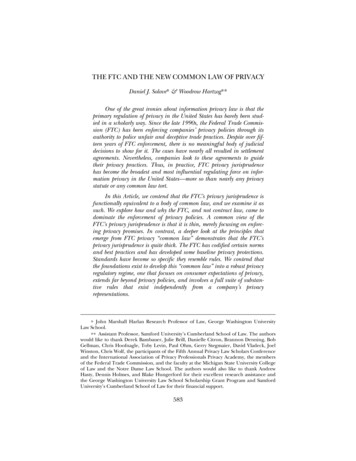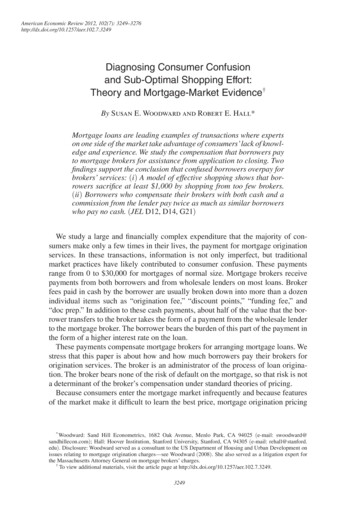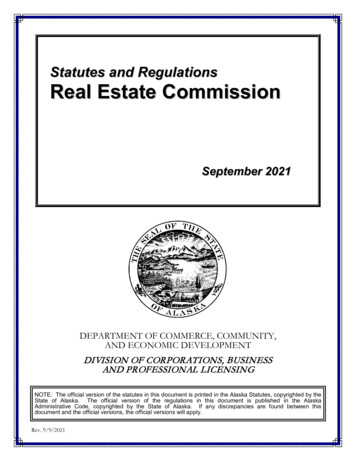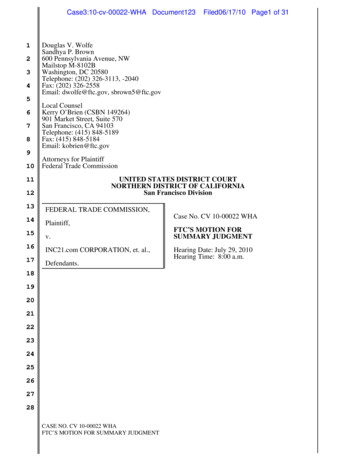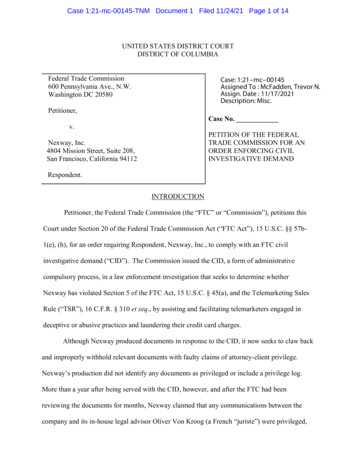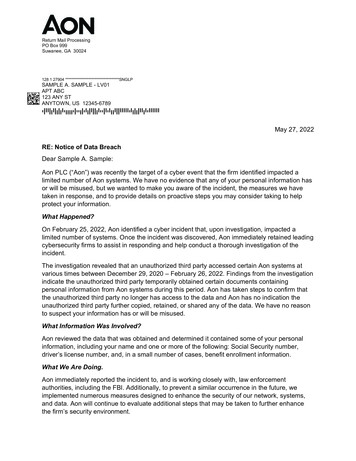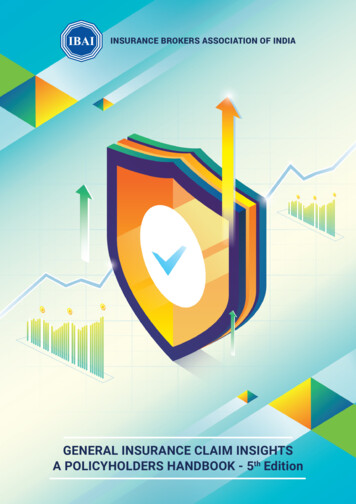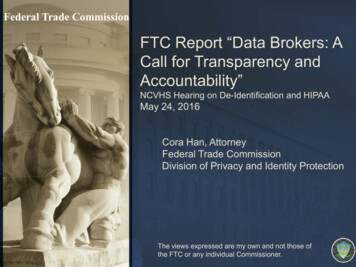
Transcription
Federal Trade CommissionFTC Report “Data Brokers: ACall for Transparency andAccountability”NCVHS Hearing on De-Identification and HIPAAMay 24, 2016Cora Han, AttorneyFederal Trade CommissionDivision of Privacy and Identity ProtectionThe views expressed are my own and not those ofthe FTC or any individual Commissioner.
Data Broker Report Sent information requeststo nine data brokers:– Nature and sources of data?– Use, maintenance, anddissemination of data?– Give consumers access, andthe ability to correct and/oropt out? The report:– Summarizes findings– Proposes legislation– Recommends best practices
Data Broker Report Data Sources– Government– Publicly available sources– Commercial data sources Development of Products– Creation of data elements and segments– Data suppression– Data storage Types of Products– Marketing– Risk mitigation– People search
Data Broker Report Findings:Characteristics of the Industry Data brokers collect consumer data from numeroussources, largely without consumers’ knowledge. The data broker industry is complex, with multiplelayers of data brokers providing data to each other. Data brokers collect and store billions of data elementscovering nearly every U.S. consumer. Data brokers combine and analyze data aboutconsumers to make inferences about them, includingpotentially sensitive information. Data brokers combine online and offline data to marketto consumers online.
Data Broker Report Findings:Consumer Choices To the extent data brokers offer consumerschoices about their data, the choices arelargely invisible and incomplete.– Marketing: Limited access and not all allow correction– Risk mitigation: Not all provide access and only oneallows for correction– People search: Not all allow consumers to opt-out
Data Broker Report Findings:Benefits and Risks Consumers benefit from many of the purposes for which databrokers collect and use data.– Prevent fraud– Improve product offerings– Deliver tailored advertisements to consumers Many of the purposes for which data brokers collect and use datapose risks to consumers. Examples:– Inability to conclude a transaction based on an error in a risk mitigationproduct– “Biker Enthusiast” data segment could help a motorcycle dealershipoffer a consumer coupons, but it could also be used by an insurancecompany to assume the consumer engages in risky behavior Storing data about consumers indefinitely may create security risks.
Data Broker Report Recommendations Legislative– Notice and disclosure– Access and correction– Opt out and suppression Best Practices– Privacy by Design Collect only data needed Dispose of data as it becomes less useful– Refrain from collecting from children and teens– Ensure downstream users don’t use information for FCRA ordiscriminatory purposes
Big Data Report Big Data: A Tool forInclusion or Exclusion– September 2014 Workshop– Spring 2014 Seminar onAlternative ScoringProducts The report––––Life cycleBenefits and risksPotentially applicable lawsRecent research
De-identification Reasonable steps to de-identify data – including bykeeping up with technological developments Public commitment not to re-identify Enforceable contracts, requiring any third parties tocommit not to re-identify
Federal Trade CommissionQuestions?chan@ftc.gov
Demanding transparency from data brokersBy Julie Brill, Published: August 15Julie Brill is a member of the Federal Trade Commission.Revelations about the extent to which the National Security Agency (NSA) collects personalinformation started a robust national debate on how best to balance national security and privacyrights. Last month, members of the House of Representatives questioned the funding for thegovernment’s data-collection programs, and last week the White House proposed steps toincrease the transparency of those programs. Along the way, consumers have gotten a crashcourse in the price we pay to participate in the online and mobile marketplace: Our most intimateinformation floats free in cyberspace, ripe for any data miner — government or otherwise — tocollect, use, package and sell.All day long, as we surf the Web, tap at apps or power up our smartphones, we send digitalinformation out into cyberspace. As we live our wired lives, we constantly add to the veins fromwhich data miners pull pure gold. It took the NSA revelations to make concrete what thisexchange means: that firms, governments or individuals, without our knowledge or consent, canamass large amounts of private information about people to use for purposes we don’t expect orunderstand.Many tech firms are calling on the government to allow them to reveal how and how often thegovernment seeks information about individuals. We ought to demand the same sort oftransparency from the commercial data brokers that know much more about us than we do aboutthem. One of the largest, Acxiom, reportedly has information on about 700 million activeconsumers worldwide, with some 1,500 data points per person. Such data brokers learn about usfrom the cookies that hitch rides as users travel online and from the social media sites where wepost everything from home addresses to pictures to magazine subscriptions and store purchases,as well as deeds on file in towns and counties. They load all this data into sophisticatedalgorithms that spew out alarmingly personal predictions about our health, financial status,interests, sexual orientation, religious beliefs, politics and habits.These dossiers are the reason that when I log in, I see an ad for suede boots but my son sees therelease date for the latest “Call of Duty” game. This may seem benign, but increasingly our datafuel more than just what ads we are served. They may also determine what offers we receive,what rates we pay, even what jobs we get.The Fair Credit Reporting Act (FCRA) provides some protections. The law requires that entitiesthat collect information for those making employment, credit, insurance and housing decisionsdo so in a manner that ensures the information is accurate. The Federal Trade Commissiontargets firms that screen potential tenants, credit recipients, employees and insurance purchaserswithout complying with the law. But in an online world in which companies large and smallinnovate constantly and — sometimes unknowingly — push legal boundaries, it is difficult toreach all of those who may engage in activities that fall afoul of the FCRA.
Further, personal data could be — and probably are — used by firms making decisions thataren’t regulated by the FCRA but still affect users' lives profoundly. These includedeterminations about whether we are too risky to do business with or aren’t right for certainclubs, dating services, schools or other programs. Citizens don’t know what of our personalinformation is on file or how it is being used, and this frames the fundamental challenge toconsumer privacy in the online marketplace: our loss of control over our most private andsensitive information.Changing the law would help. But even without legislation, we can begin to address the problemwith a comprehensive initiative to give consumers the knowledge and tools they need to reassertsome control over their personal data.This approach, which I call Reclaim Your Name, can be adopted by the industry without agovernment directive. Its four basic components would empower people to find out how brokersare collecting and using their data; give people access to information that data brokers haveamassed about them; allow people to opt out if they learn that a data broker is selling theirinformation for marketing purposes; and provide consumers the opportunity to correct errors ininformation used for decisions about substantive benefits.More than a year ago, I called on the data-broker industry to develop a user-friendly, one-stoponline shop to achieve these goals. In a helpful move, the chief executive of Acxiom, Scott E.Howe, recently announced plans to open his company’s dossiers to consumers. I invite Howe,his compatriots Bryan Kennedy at Epsilon and Don Robert of Experian, and other industryleaders to come to the table and hash out how we can put the principles of Reclaim Your Nameinto practice.There is no reason that data brokers and firms that use consumer data cannot coexist with asystem that empowers consumers to make real choices about how our privacy information isused. Such a system would go a long way toward restoring consumer trust in the online andmobile ecosystems, allowing us to continue to enjoy all the convenience, entertainment andwonder that cyberspace has to offer.Read more about this issue: Jon Leibowitz: Protecting privacy in a TMI world Michael Chertoff:Cloud computing and the looming global privacy battle The Post’s View: Google’s privacypolicy complicates the protection of personal data Outlook: Five myths about privacy The Post’sView: In NSA programs, democracy works in secret
some control over their personal data. This approach, which I call Reclaim Your Name, can be adopted by the industry without a government directive. Its four basic components would empower people to find out how brokers are collecting and using their data; give people access to information that data brokers have
